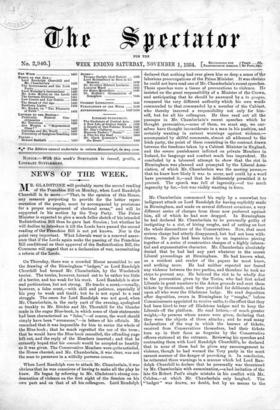When Lord Randolph rose to attack Mr. Chamberlain, it was
obvious that he was conscious of having to make all the play he knew. He began by referring to Mr. Gladstone's strong con- demnation of violence on the first night of the Session on his own part and on that of all his colleagues. Lord Randolph
declared that nothing had ever given him so deep a sense of the laborious preoccupations of the Prime Minister. It was obvious he could not have read one of Mr. Chamberlain's recent speeches. Those speeches were a tissue of provocations to violence. He insisted on the great responsibility of a Minister of the Crown, and anticipating that he should be answered by a to quoque, compared the very different authority which his own words commanded to that commanded by a member of the Cabinet, who thereby incurred a responsibility not only for him- self, but for all his colleagues. He then read out all the passages in Mr. Chamberlain's recent speeches which he thought provocative,—some of them, we must say, we our- selves have thought inconsiderate in a man in his position, and certainly wanting in earnest warnings against violence,— accompanied by skilful comments, almost all addressed to the Irish party, the point of them consisting in the contrast drawn between the freedoms taken by a Cabinet Minister in England, and the severe punishment inflicted on private Members in Ireland, for language and conduct much less imprudent. He concluded by a laboured attempt to show that the riot in Birmingham was planned and prompted by the Liberal Asso- ciation, of which Mr. Chamberlain was the moving power,— that he knew how likely it was to occur, and could by a word have prevented it—and that he deliberately permitted it to proceed. The speech was full of ingenuity,—of too much ingenuity by far,—but was visibly wanting in force.














































